Texas Teen Book Festival draws record crowd in Austin
Story and photos by Michelle Newby, Contributing Editor
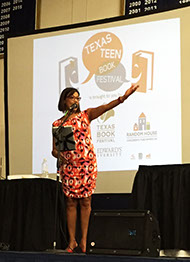 The seventh annual Texas Teen Book Festival was held Sept. 26 at St. Edward’s University in Austin. One of the largest teen book festivals in the country (organizers expected close to 5,000 attendees), this year’s was the biggest event in the festival’s history, with nine panels, a game show, writing workshops, several noted speakers, and book signings all day long.
The seventh annual Texas Teen Book Festival was held Sept. 26 at St. Edward’s University in Austin. One of the largest teen book festivals in the country (organizers expected close to 5,000 attendees), this year’s was the biggest event in the festival’s history, with nine panels, a game show, writing workshops, several noted speakers, and book signings all day long.
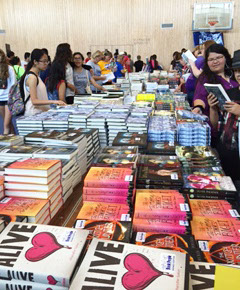
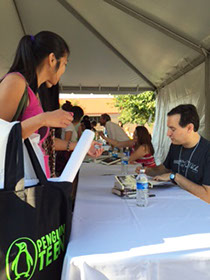
The keynote speaker was Sonia Manzano, better known as “Maria” from Sesame Street. She discussed and read from her new memoir, Becoming Maria: Love and Chaos in the South Bronx, stressing that children need to see people on television who look like they do and that books are importance because in today’s schools education equals testing and books may be the one place where there is no single correct answer.
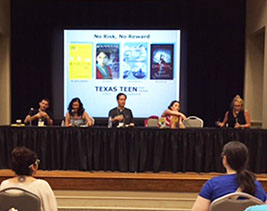
The “No Risk, No Reward” panel was moderated by Texas’s own Lindsey Lane, author of Evidence of Things Not Seen. Jesse Andrews (Me and Earl and the Dying Girl), David Levithan (Another Day), Cindy Pon (Serpentine), and Carrie Ryan (Daughter of Deep Silence) read from their newest novels and talked about the nature of risk and the risks they take in their writing. It turned into a fascinating discussion of the risks inherent in YA literature, in coming-of-age stories, and reached the general conclusion among the panelists that subject matter termed “dark” or “edgy” usually means it’s real. They emphasized the need to write about the real so we can read and know we’re not alone. When the floor opened for questions this panel was particularly generous with their advice to budding writers and reassurances that first drafts are supposed to be terrible.
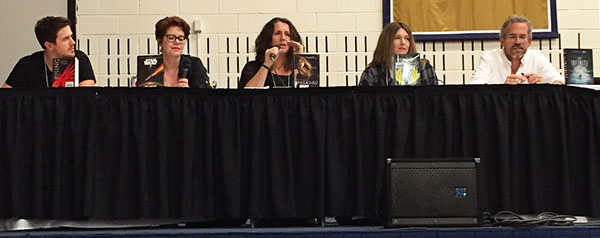
South Austin’s own Griffin Mauser (whose motto is “Beige is a state of mind”), poet and artist, moderated the “Drawing between the Lines” graphic panel. Chad Nichols, Michener Center for Writers alum, screenwriter, and co-author of the Intergalactic Nemesis series, moderated the “Reel Food for Thought” panel. Dr. Sara Villanueva, on faculty at St. Edward’s, discussed and signed her new book, The Angst of Adolescence: How to Parent Your Teen and Live to Laugh About It.
Texas author Jenny Martin (Tracked) took part in a “Freshman Fifteens” panel on how writers become authors, and the science fiction “Future Possible?” panel. The “Future Possible?” panel was moderated by Shawn Mauser, librarian at the Ann Richards School for Young Women Leaders. Jenny Martin was joined on this panel by fellow Texas writer Sophie Jordan (Unleashed), Pierce Brown (The Red Rising Trilogy), Claudia Gray (Journey to Star Wars: The Force Awakens Lost Stars), and Rick Yancey (The Fifth Wave). This boisterous panel came to the conclusion that writers are schizophrenic (Yancey spoke of a “fugue” state when he’s really into his writing), but treatment is unnecessary since writing is therapy. When the floor was opened the young readers attending this panel asked some particularly astute questions about process and characterization and were rewarded with thoughtful answers.
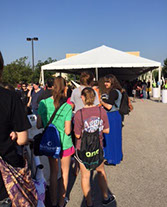 During my day at the Texas Teen Book Festival I kept coming back to the same Phillip Pullman quote. “There are some themes, some subjects, too large for adult fiction; they can only be dealt with adequately in a children’s book.”
During my day at the Texas Teen Book Festival I kept coming back to the same Phillip Pullman quote. “There are some themes, some subjects, too large for adult fiction; they can only be dealt with adequately in a children’s book.”
* * * * *
